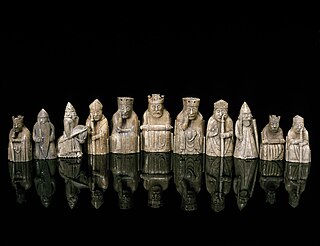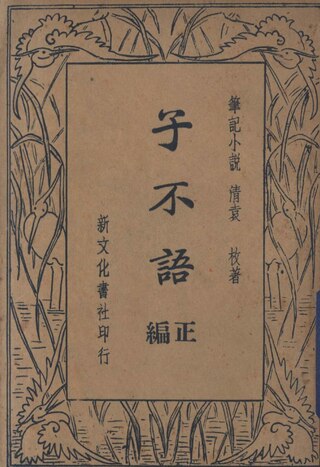Related Research Articles

Confucianism, also known as Ruism or Ru classicism, is a system of thought and behavior originating in ancient China, and is variously described as a tradition, philosophy, religion, theory of government, or way of life. Confucianism developed from what was later called the Hundred Schools of Thought from the teachings of the Chinese philosopher Confucius (551–479 BCE). Confucius considered himself a transmitter of cultural values inherited from the Xia (c. 2070–1600 BCE), Shang (c. 1600–1046 BCE) and Western Zhou dynasties (c. 1046–771 BCE). Confucianism was suppressed during the Legalist and autocratic Qin dynasty (221–206 BCE), but survived. During the Han dynasty, Confucian approaches edged out the "proto-Taoist" Huang–Lao as the official ideology, while the emperors mixed both with the realist techniques of Legalism.

Kong Qiu, generally known as Kongzi or Kong Fuzi and commonly latinized to Confucius, was a Chinese philosopher of the Spring and Autumn period who is traditionally considered the paragon of Chinese sages. Confucius's teachings and philosophy underpin East Asian culture and society, and remain influential across China and East Asia to this day. His philosophical teachings, called Confucianism, emphasized personal and governmental morality, correctness of social relationships, justice, kindness, and sincerity, as well as an emphasis on a ruler's duty to their subjects.
Chinese classic texts or canonical texts or simply dianji (典籍) refers to the Chinese texts which originated before the imperial unification by the Qin dynasty in 221 BC, particularly the "Four Books and Five Classics" of the Neo-Confucian tradition, themselves a customary abridgment of the "Thirteen Classics". All of these pre-Qin texts were written in either Old or Classical Chinese. All three canons are collectively known as the Classics.

Xiangqi, commonly known as Chinese chess or elephant chess, is a strategy board game for two players. It is the most popular board game in China. Xiangqi is in the same family of games as shogi, janggi, Western chess, chaturanga, and Indian chess. Besides China and areas with significant ethnic Chinese communities, this game is also a popular pastime in Vietnam, where it is known as cờ tướng, literally 'General's chess'.
One of the most common ways for chess historians to trace when the board game chess entered a country is to look at the literature of that country. Although due to the names associated with chess sometimes being used for more than one game, the only certain reference to chess is often several hundred years later than uncertain earlier references. The following list contains the earliest references to chess or chess-like games.

Liubo was an ancient Chinese board game for two players. The rules have largely been lost, but it is believed that each player had six game pieces that were moved around the points of a square game board that had a distinctive, symmetrical pattern. Moves were determined by the throw of six sticks, which performed the same function as dice in other race games.
The Great Learning or Daxue was one of the "Four Books" in Confucianism attributed to one of Confucius' disciples, Zengzi. The Great Learning had come from a chapter in the Book of Rites which formed one of the Five Classics. It consists of a short main text of the teachings of Confucius transcribed by Zengzi and then ten commentary chapters supposedly written by Zengzi. The ideals of the book were attributed to Confucius, but the text was written by Zengzi after his death.

The Analects, also known as the Sayings of Confucius, is an ancient Chinese philosophical text composed of sayings and ideas attributed to Confucius and his contemporaries, traditionally believed to have been compiled by his followers. There is consensus among scholars that large parts of it were written during the Warring States period, and that it achieved its final form during the mid-Han dynasty. By the early Han dynasty the Analects was considered merely a "commentary" on the Five Classics, but the status of the Analects grew to be one of the central texts of Confucianism by the end of that dynasty.

James Legge was a Scottish linguist, missionary, sinologist, and translator who was best known as an early translator of Classical Chinese texts into English. Legge served as a representative of the London Missionary Society in Malacca and Hong Kong (1840–1873) and was the first Professor of Chinese at Oxford University (1876–1897). In association with Max Müller he prepared the monumental Sacred Books of the East series, published in 50 volumes between 1879 and 1891.

The Classic of Poetry, also Shijing or Shih-ching, translated variously as the Book of Songs, Book of Odes, or simply known as the Odes or Poetry, is the oldest existing collection of Chinese poetry, comprising 305 works dating from the 11th to 7th centuries BC. It is one of the "Five Classics" traditionally said to have been compiled by Confucius, and has been studied and memorized by scholars in China and neighboring countries over two millennia. It is also a rich source of chengyu that are still a part of learned discourse and even everyday language in modern Chinese. Since the Qing dynasty, its rhyme patterns have also been analysed in the study of Old Chinese phonology.

The game of Go originated in China in ancient times. It was considered one of the four essential arts of a cultured Chinese scholar in antiquity and is described as a worthy pastime for a gentleman in the Analects of Confucius. It reached Korea by the 5th century, in the 7th century it had reached Japan. The game was described by Matteo Ricci in 1615 and by Thomas Hyde in 1694, but it did not become popular in the West until the late 19th century.

Arthur David Waley was an English orientalist and sinologist who achieved both popular and scholarly acclaim for his translations of Chinese and Japanese poetry. Among his honours were appointment as Commander of the Order of the British Empire in 1952, receiving the Queen's Gold Medal for Poetry in 1953, and being invested as a Member of the Order of the Companions of Honour in 1956.

The history of chess can be traced back nearly 1,500 years to its earliest known predecessor, called chaturanga, in India; its prehistory is the subject of speculation. From India it spread to Persia, where it was modified in terms of shapes and rules and developed into Shatranj. Following the Arab invasion and conquest of Persia, chess was taken up by the Muslim world and subsequently spread to Europe via Spain and Italy. The game evolved roughly into its current form by about 1500 CE.

The Zuo Zhuan, often translated The Zuo Tradition or The Commentary of Zuo, is an ancient Chinese narrative history that is traditionally regarded as a commentary on the ancient Chinese chronicle Spring and Autumn Annals. It comprises 30 chapters covering a period from 722 to 468 BC, and focuses mainly on political, diplomatic, and military affairs from that era.

Lionel Giles CBE was a British sinologist, writer, and philosopher. Lionel Giles served as assistant curator at the British Museum and Keeper of the Department of Oriental Manuscripts and Printed Books. He is most notable for his 1910 translations of The Art of War by Sun Tzu and The Analects of Confucius.
The word junzi is a Chinese philosophical term often translated as "gentleman," "superior person", or "noble man." The term is frequently translated as "gentleman", since the characters are overtly gendered. However, in recent years, scholars have been using the term without the gender component, and translate the term as "distinguished person", "moral person", and so on. The characters 君子 were employed both the Duke Wen of Zhou in the "Classic of Changes" 易經 (I-ching) and Confucius in his works to describe the ideal man.

The Classic of Filial Piety, also known by its Chinese name as the Xiaojing, is a Confucian classic treatise giving advice on filial piety: that is, how to behave towards a senior such as a father, an elder brother, or a ruler.

Li is a classical Chinese word which is commonly used in Chinese philosophy, particularly within Confucianism. Li does not encompass a definitive object but rather a somewhat abstract idea and, as such, is translated in a number of different ways. Wing-tsit Chan explains that li originally meant "a religious sacrifice, but has come to mean ceremony, ritual, decorum, rules of propriety, good form, good custom, etc., and has even been equated with natural law."

Ren is a Confucian virtue meaning the good quality of a virtuous human when reaching for higher ideals or when being altruistic. Ren is exemplified by functional, instinctual, parental feelings and intentions of encouragement and protection for their children. It is considered the outward expression of Confucian ideals.

What the Master Would Not Discuss (Zibuyu), alternatively known as Xin Qixie, is a collection of supernatural stories compiled by Qing Dynasty scholar and writer Yuan Mei. The original collection consist of over 700 stories.
References
- ↑ Banaschak: A story well told is not necessarily true - being a critical assessment of David H. Li's "The Genealogy of Chess"